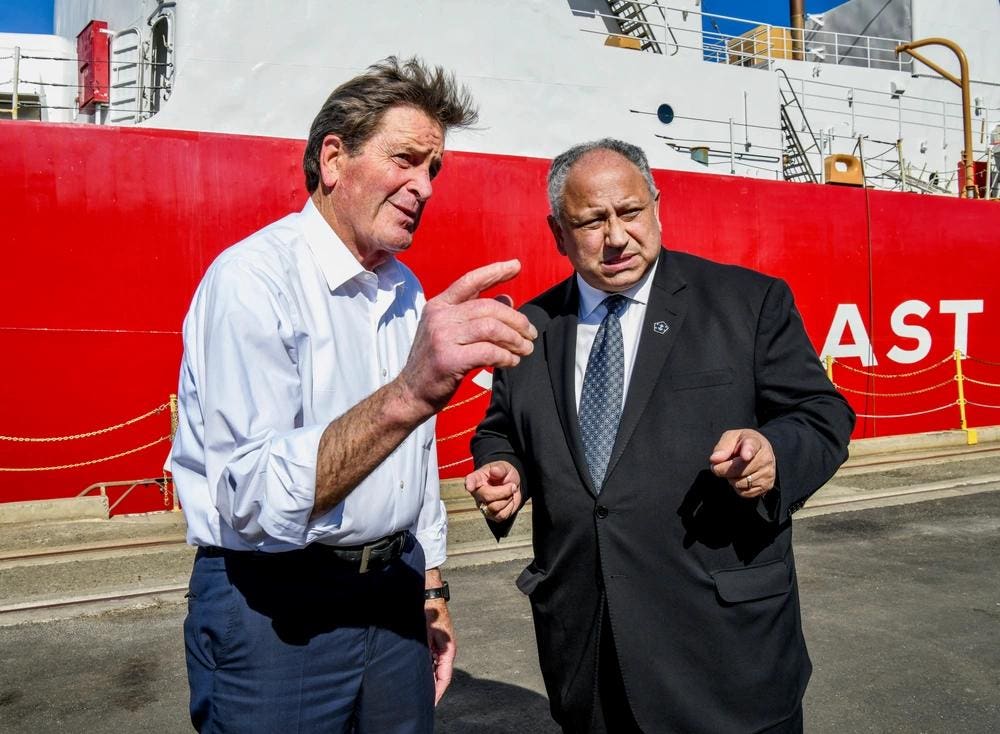The months-long hold on senior military promotions by Sen. Tommy Tuberville (R-Ala.) has unintentionally freed Navy Secretary Carlos Del Toro from an excruciating bureaucratic limbo.
With no “confirmed” Chief of Naval Operations to keep the Navy secretary in check, and almost every other high-level Navy leader on tenterhooks over an uncertain Senate approval process, Del Toro is busy rolling out new initiatives, demanding Navy accountability and generally making the most of his newfound bureaucratic freedom.
For a service secretary, Del Toro’s decisive ascension to relevance is unprecedented.
Del Toro has moved quickly. After the mid-August retirement of Admiral Michael M. Gilday, the former Chief of Naval Operations, Del Toro has raced to position President Joe Biden and the Democratic Party for some big national security wins in maritime policy.
It’s no secret that Del Toro, a former ship captain and successful businessman, has chafed in the downsized Navy Secretariat post. A year ago, caught between a scandal-prone Admiralty and powerful Defense Department leaders, Del Toro cut a tragic figure, left barely able to even hire his own team to staff the Navy front office.
But now, after being unshackled from the post’s bureaucratic constraints, the Navy secretary has slipped his moorings, and is racing to make up for lost time.
All Hail The SECNAV’s Bold Sortie
From the moment Admiral Gilday was ceremoniously clapped out of the Pentagon, Del Toro has been on a bureaucratic rampage.
Within forty-eight hours of Gilday’s retirement, Del Toro was off touring New Jersey’s Bayonne Dry Dock and Repair Corporation, a New Jersey ship repair facility. He followed that visit with a trip this week to California’s now-privatized Mare Island Naval Shipyard, offering a strong counterpoint to Gilday’s oft-troubled efforts to develop and hold to a long-term fleet maintenance strategy.
Del Toro’s plans to shutter the Unmanned Task Force, founded by Admiral Gilday in September 2021, bubbled into public view within just a few weeks of Gilday’s departure. The Secretary followed through, rolling out the newly-formed “Disruptive Capabilities Office” days ago.
Three months after a beaming Admiral Gilday presided over the retirement ceremony for Rear Adm. Peter Stamatopoulos, Del Toro put the Navy’s broken accountability system on full display by finally censuring Stamatopoulos and two other Admirals who had retired on Gilday’s watch over failings associated with a disastrous 2021 spill at Hawaii’s Red Hill Bulk Fuel Storage Facility.
In late-September, Del Toro established the Navy Department Science and Technology Board, offering the Secretary’s staff a non-Navy source of high-level guidance on “scientific, technical, manufacturing, acquisition, logistics, medicine and business management functions.” A week later, he followed up his new focus on high-tech challenges with a visit to Ginkgo Bioworks, a well-connected bioinformatics and synthetic biology-focused company.
At Harvard University, the Navy secretary rolled out a far-reaching “New Maritime Statecraft” strategy that aims to go beyond naval diplomacy and meld together a “national, whole-of-government effort to build comprehensive U.S. and allied maritime power, both commercial and naval.”
And, finally, earlier this week, the invigorated Del Toro even dared to tweak the nose of Republican members of Congress by announcing the next Virginia Class submarine will be the future USS San Francisco (SSN-810). On the very day former House Speaker Nancy Pelosi was summarily ushered out of her Capital hideaway—with less than 24-hours of notice—Del Toro announced that Pelosi was to be the sub’s sponsor.
Making Lemonade Out Of Tuberville Lemons
By refusing to confirm high-level military officers, Senator Tuberville has unintentionally put the Biden Administration in a position where it can drive maritime security policy.
The interplay between the Admiralty and the Navy Secretary is not something that gets a lot of scrutiny in Washington. But, usually, when faced with an independent-minded Navy secretary, Admirals and Department of Defense bureaucrats join forces in defenestrating the Navy’s civilian leaders.
In general, the Pentagon is a more serene place when a Navy secretary is content to follow orders and do little more than show the flag at ceremonial events.
Tuberville may well be upset at giving the Biden Administration an opening to grab and run with a new maritime security strategy. But, by upending a long-standing operational dynamic at the Pentagon, Tuberville can certainly take solace in the fact that he is giving Washington an opportunity to see how America’s insular and problem-riddled Navy, long accustomed to essentially running itself, responds to active and empowered civilian leadership.
Read the full article here





